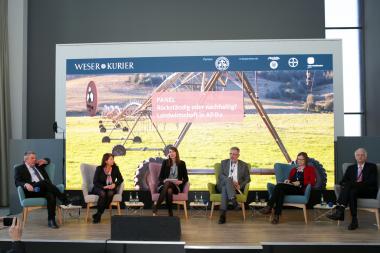October, 7th: World Cotton Day
- World Cotton Day on 7 October Highlights the Importance of Cotton for Development Policy
Bremen - Stemming from a 2019 initiative of the African Cotton-4 countries Benin, Burkina Faso, Chad and Mali, World Cotton Day will take place this year on 7 October. The event is organised by the Geneva-based World Trade Organisation (WTO) and is supported by the Food and Agriculture Organisation of the United Nations (FAO), the United Nations Conference on Trade and Development (UNCTAD), the International Trade Centre (ITC) and the International Cotton Secretariat (ICAC). The Bremen Cotton Exchange is also involved.
“Cotton is often underestimated because it is so natural. Behind it are millions of people, for example many farmers, field workers, employees in ginning factories, logistics providers and traders. We want to honour their achievements,” said the President of the Bremen Cotton Exchange, Stephanie Silber.
According to the WTO, the aim of World Cotton Day is to highlight the global economic importance of cotton and to raise awareness of the raw material by recognising the work of everyone involved in its cultivation, processing and trade. At the same time, within the framework of international cooperation, it is hoped that supporters and investors can be found to aid with technological and economic progress within the cotton value chain.
This time, the entire world cotton community will be involved in World Cotton Day on Wednesday, 7 October 2020. A wide variety of campaigns and events are taking place everywhere to draw attention to the importance of cotton and its possible uses.
Cotton is one of the most relevant agricultural raw materials in the world. Around 26 million tonnes of it are harvested annually. Approximately 150 million people in almost 80 countries around the world live from the cultivation of the natural fibre. A large number of these live in developing countries, where cotton cultivation is of particular importance as a cash crop.
Cotton is known as an agricultural product that is turned into a textile. The raw material is indispensable in fashion and clothing – and has been for thousands of years. But the use of cotton now goes far beyond textiles. For example, cosmetic products such as hand creams and hair shampoo are made from the oil of cotton seeds. The raw material is also used in the manufacture of banknotes, furniture and technical textiles, as well as in medical technology.
Against the background of the current discussion on sustainability and sustainable consumption, the role of natural fibres is becoming even more important. Cotton is biodegradable and a renewable resource. It can be grown again and again in agriculture through cultivation in crop rotation. This secures incomes and enables efficient value creation within the global production and processing chain.
The Bremen Cotton Exchange will actively support World Cotton Day with cross-media coverage. In addition, in time for World Cotton Day, three thematically different, emotionally appealing short films about cotton will be launched. They are aimed at consumers as customers of the textile and clothing trade and provide information about the benefits and properties of cotton and answer questions about its sustainability. In keeping with the times, they will be published via virtual media.
Bremer Baumwollbörse Weltbaumwolltag World Cotton Day 2020 Baumwolle Bremen Cotton Exchange
Bremer Baumwollbörse



















